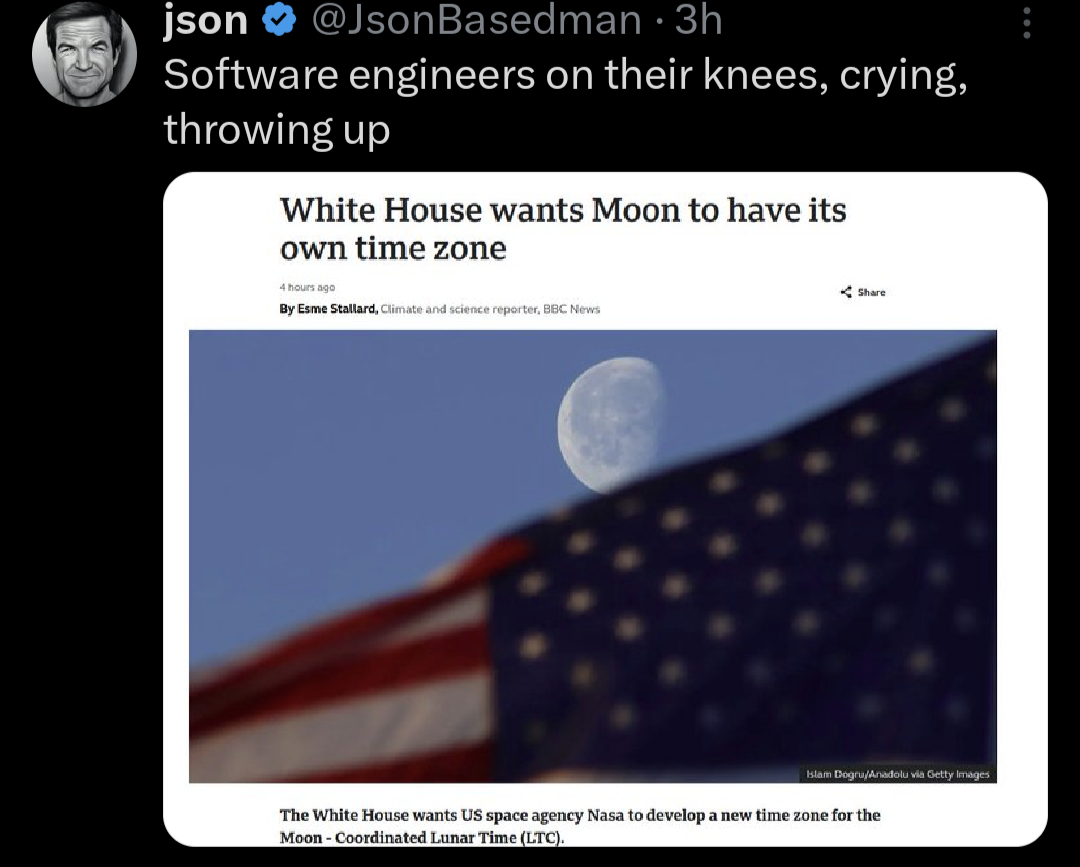this post was submitted on 17 Apr 2024
1454 points (98.6% liked)
Programmer Humor
20039 readers
2132 users here now
Welcome to Programmer Humor!
This is a place where you can post jokes, memes, humor, etc. related to programming!
For sharing awful code theres also Programming Horror.
Rules
- Keep content in english
- No advertisements
- Posts must be related to programming or programmer topics
founded 2 years ago
MODERATORS
you are viewing a single comment's thread
view the rest of the comments
view the rest of the comments

But would the moon work on a 24 hour system at all?
I can’t believe I just typed that as a serious comment
Didn’t Bajor have a 28 hour day? I’m now voting for Universal Bajoran Time
If you're setting moon time to the day/night cycle of the moon, yeah, it would actually have a much longer day, from what I understand.
I might be wrong, but to my best understanding, the moon is tidally locked to the earth, meaning the same side of the moon is always facing the surface of our planet. Which means the rotation of the moon, and the length of a day on the moon would be tied to how fast it orbits the earth.
You can tell the duration of an orbit by simply following the moon cycle ("new" moon (midnight) through "full" moon (noon) and back to a "new" moon. Based on this, unless I've made a serious error in my logic, a moon day would be something like 20-30 earth days.
If I Google it, the moon orbits earth approximately every 27.3 days. Which is about 665h 12m... Give or take a few hours.
Our entire concept of time, days, months, and years, breaks on the moon. On earth, an hour is 1/24th of a rotation of the planet. A day is one full day/night cycle, a year is one orbit around the sun.
When you transpose this principle to the moon, am hour is 1/24th of a rotation of the moon, which happens to be 1/24th of a year, which is one orbital rotation around the earth. So one day = one year on the moon.
So how do we measure time on the moon in a way that isn't completely insane? The only logical thing I can think of is to fundamentally lock the time zone of the moon to the earth. That the date, and maybe even the time, isn't based on the moon, but rather transposed from some definition of the same on earth.
This also leads me into a rant/discussion about time in SciFi. Once you leave the orbit and reference point of Earth, what is a day? An hour? A year? You have no point of reference to base such notions of time. Why is there a "night shift" in programs like Star Trek? Why is there really only one captain? Why does everything on these shows seem to occur during their idea of "daytime"?
Then there negotiating with some alien race and say they'll reconvene tomorrow about something... Tomorrow, based on what? You're in space. It makes sense if they're in orbit of a planet, but then you get to see standoffs in the middle of fucking nothing, and they're like "you have 24 hours to decide". Okay. 24 hours based on what exactly?
I appreciated MiB's take on this in the film. They defined not only how much time they had to return the galaxy, but in what format the time was being counted in. Which they could calculate and adjust to earth time.
This all sets aside relativity, since when you're moving near, at, or beyond the speed of light, you experience time differently (see: interstellar), also gravity can affect this, and other factors. But somehow, they just side-shuffle from the whole time thing and just focus on the drama of it all. Viewers are too enthralled with the spectacle, not realizing that these Romans or boleans, or Klingons, or cardassians, or whatever, probably have a completely different idea of how much time their version of "one hour" or "one day" is.
It's fascinating and frustrating.
I love it and hate it all at the same time.
Time sucks. It's never correct, often ignored, and bluntly, a strange concept that isn't, IMO, well defined. We have the idea pretty well set up here on earth, based entirely on things happening on and to this planet, but if you take that reference point away, everything collapses.